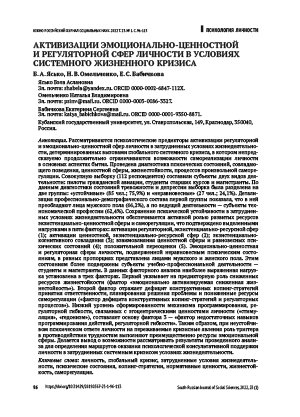Abstract
We consider psychological predictors of activation of regulatory and emotional-value spheres of personality in difficult conditions of life activity, determined by the challenges of the global system crisis, which limits the possibility of self-realization of personality in the main aspects of being for an unpredictably long period of time. Diagnostics of mental states, coping behavior, value sphere, resilience, and processes of voluntary self-regulation were carried out. The total sample (112 respondents) consisted of subjects of two types of activity: civil aviation pilots senior students, and undergraduates. The detailed professional and demographic composition of the first group showed that it is dominated by males (66.2%), and by the leading activity – the subjects of technonomic professions (62.4%). According to the diagnostics of anxiety and depression, the sample was divided into two groups: “stable” (85 people; 75.9%) and “unbalanced” (27 people; 24.1%). Preservation of mental stability in difficult conditions of life activity is provided by an active role of the developed resources of existential-value sphere and self-regulation that is confirmed by the allocated loadings in five factors: activation of regulatory, existential-resource spheres (1); activation of value, existential-resource spheres (2); existential-cognitive coping (3); mutual influence of value sphere and equilibrium mental states (4); positive revaluation (5). The emotional-value and regulatory spheres of a personality subjected to non-equilibrium mental states are represented in equal proportions by males and females. The subjects of educational and professional activity – students and undergraduates — are more susceptible to these conditions. In the data of factor analysis, the most pronounced load was detected in three factors. The first one indicates the predictive role of reduced resilience resources (“Emotionally Activated Reduced Resilience Factor”). The second factor reflects the deficit of constructive coping strategies of taking responsibility, planning problem solving and reduced self-regulation resources (“Factor of deficit of constructive coping strategies and regulatory processes”). The low level of formation of the programming mechanism and regulatory flexibility connected with the egocentric values of the personality (“stimulation”, “hedonism”) form the basis of factor‑3 – “The factor of insufficient skills of programming of actions, regulatory flexibility”. Thus, at unstable mental “answer” of a person experiencing crisis phenomena, the role of a trigger in counteracting difficulties is played mainly by resources of the emotional sphere. It is inferred that it is possible to consider the results of the analysis to determine the routes of psychological counseling support of the person in conditions of life activity hampered by a systemic crisis.
Keywords
References
- Bityutskaya, Ye. V. (2020). Struktura i dinamika obraza trudnoy zhiznennoy situatsii [The Structure and Dynamics of The Image of a Difficult Life Situation]. Voprosy psikhologii [Voprosy Psychologii], 66(3), 116–131.
- Edwards, J. R. (1988). The Determinants and Consequences of Coping with Stress. In C. L. Cooper, R. Payne (Eds) Causes, Coping and Consequences of Stress at Work (p. 233–263). Chichester: Wiley.
- Karandashev, V. N. (2004). Metodika Shvartsa dlya izucheniya tsennostey lichnosti: kontseptsiya i metodicheskoye rukovodstvo [Schwartz’s Methodology for Studying Personality Values: A Concept and Methodological Guide]. SPb.: Rech’.
- Karpinskiy, K. V. (2008). Oprosnik smyslozhiznennogo krizisa: monografiya [Questionnaire of Meaning-life Crisis: Monograph]. Grodno: GrGU.
- Kobasa, S. C. (2011). Stressful Life Events, Personality, and Health — Inquiry into Hardiness. Journal of Personality and Social Psychology, 37(1), 1–11.
- Lazarus, R. S. Folkman, S. (1984). Stress, Appraisal and Coping. New York: Springer Publishing Cоmpany.
- Leont’yev, D. A., Rasskazova, Ye. I. (2006). Test zhiznestoykosti [The Test of Resilience]. Moskva: Smysl.
- Leont’yev, D. A. (2020). Virazhi i mirazhi pandemicheskogo soznaniya [Turns and Mirages of Pandemic Consciousness: Report]. Psikhologicheskaya gazeta [Psychological Newspaper]. Retrieved from https://psy.su/feed/8337/
- Maddi, S. R. (2004). The Role of Hardiness and Religiosity in Depress and Anger. International Journal of Existential Psychology & Psychotherapy, 1(1), 38–49.
- Maddi, S. R. (2006). Hardiness: The Courage to Grow from Stresses. The Journal of Positive Psychology, 1(3), 160–168
- Morosanova, V. I. (2004). Oprosnik “Stil’ samoregulyatsii povedeniya” (SSPM): Rukovodstvo [Self-Regulation Style Questionnaire (SMSS): Guide]. Moskva: Kogito-TSentr.
- Morosanova, V. I., Aronova, K. A. (2007). Samosoznaniye i samoregulyatsiya povedeniya [Self-awareness and Self-regulation of Behavior]. Moskva: Izd-vo “Institut psikhologii RAN”.
- Osukhova, N. G. (2012). Psikhologicheskaya pomoshch’ v trudnykh i ekstremal’nykh situatsiyakh [Psychological Assistance in Difficult and Extreme Situations]. Moskva: Izdatel’skiy tsentr “Akademiya”.
- Prokhorov, A. O. (2004). Praktikum po psikhologii sostoyaniy [Workshop on the Psychology of States]. SPb: Rech’.
- Prokhorov, A.O. (2009). Smyslovaya regulyatsiya psikhicheskikh sostoyaniy [The Semantic Regulation of Mental States]. Moskva: Izd-vo “Institut psikhologii RAN”.
- Vodop’yanova, N. Ye. (2009). Psikhodiagnostika stressa [Psychodiagnostics of Stress]. SPb: Piter.
 Русский
Русский


